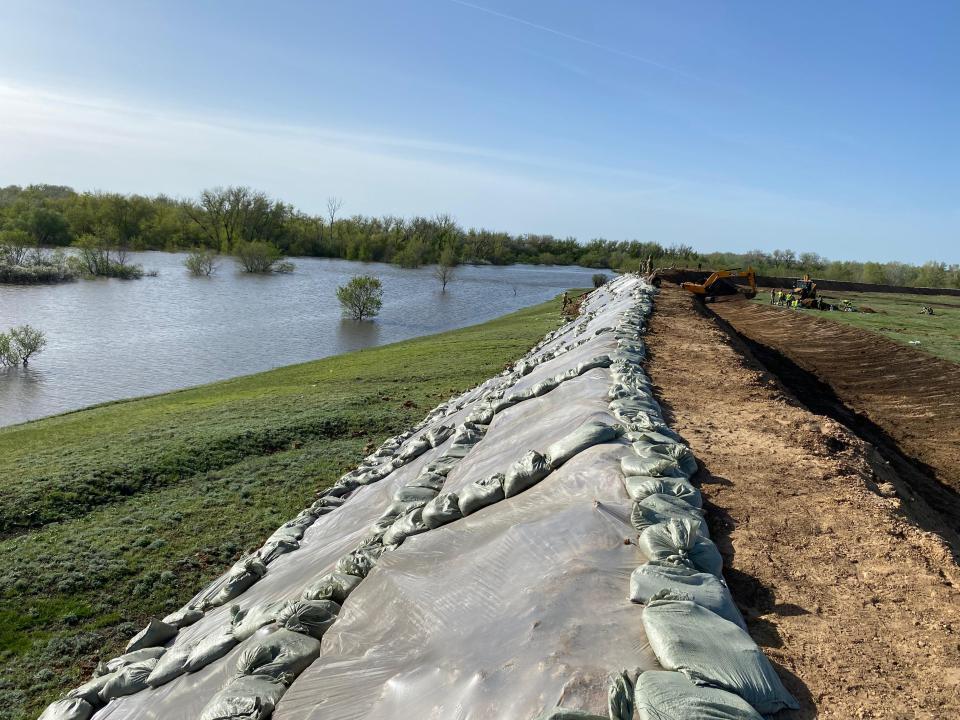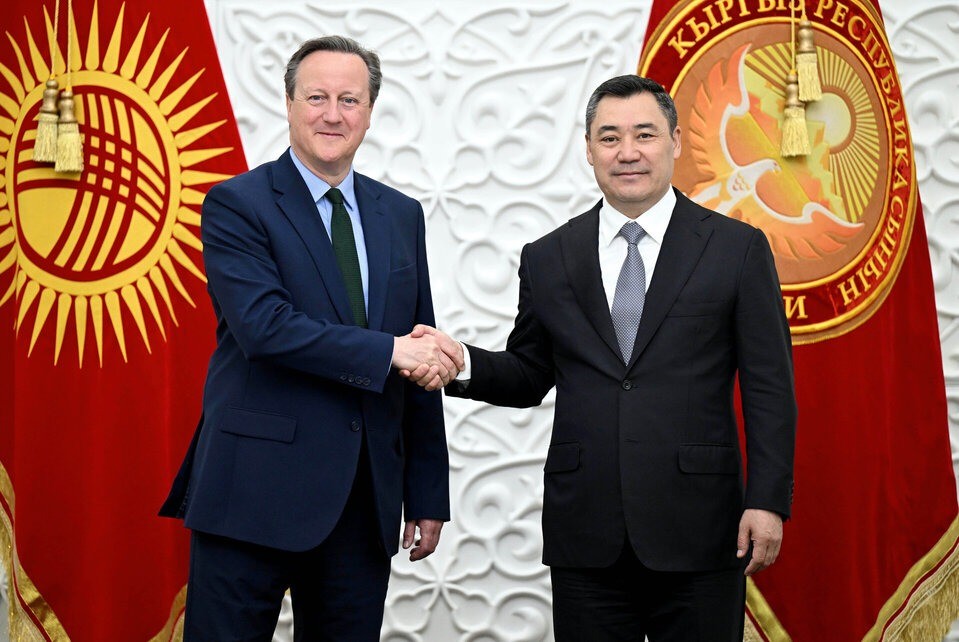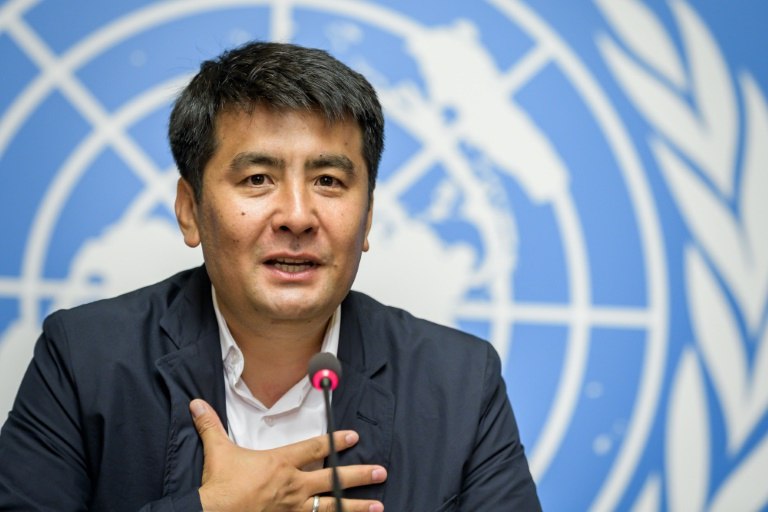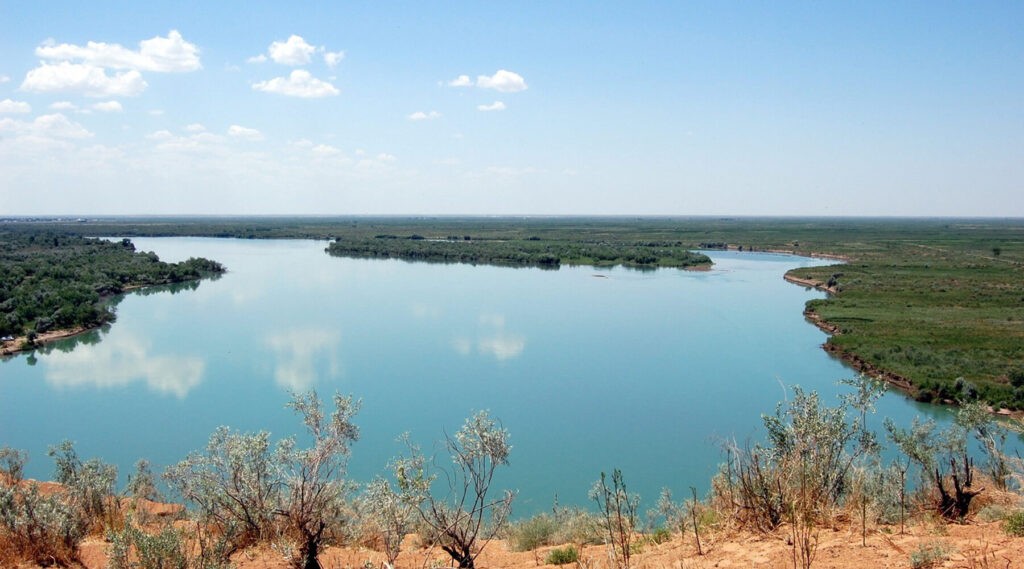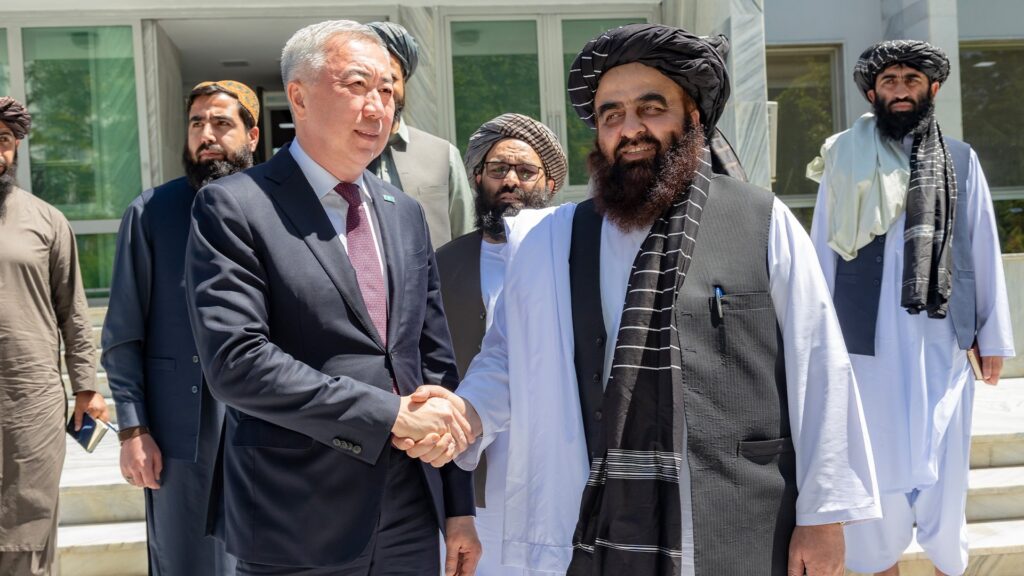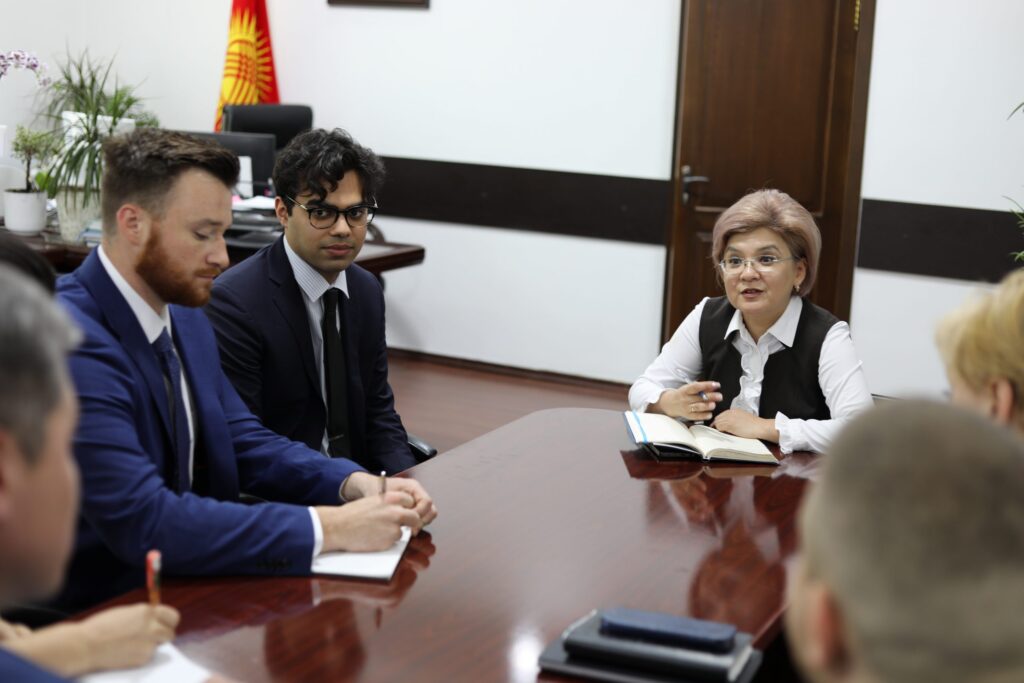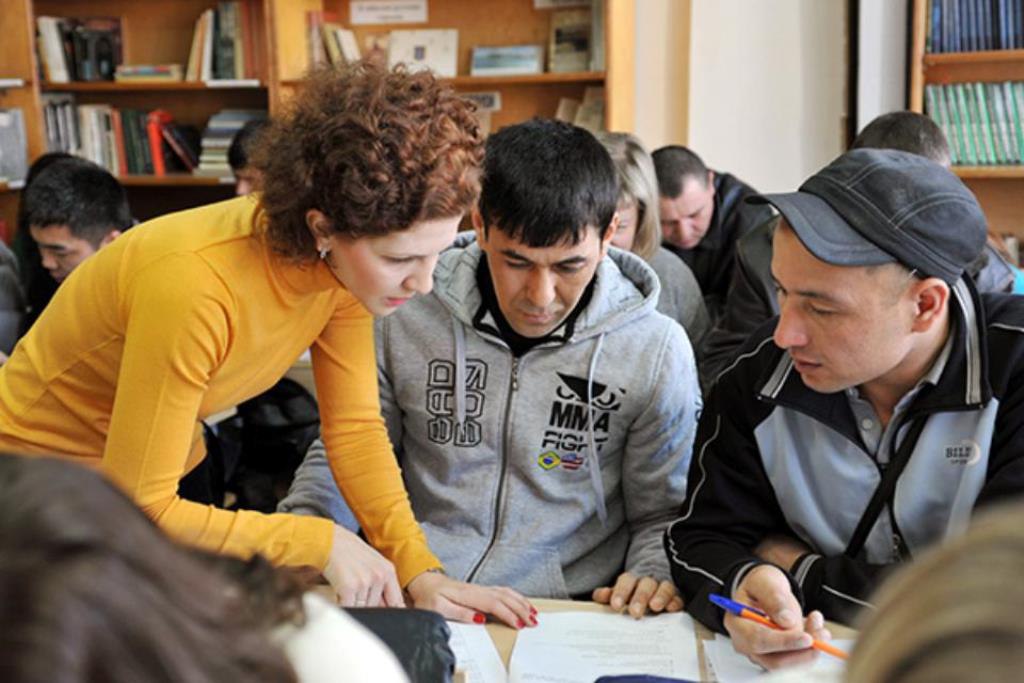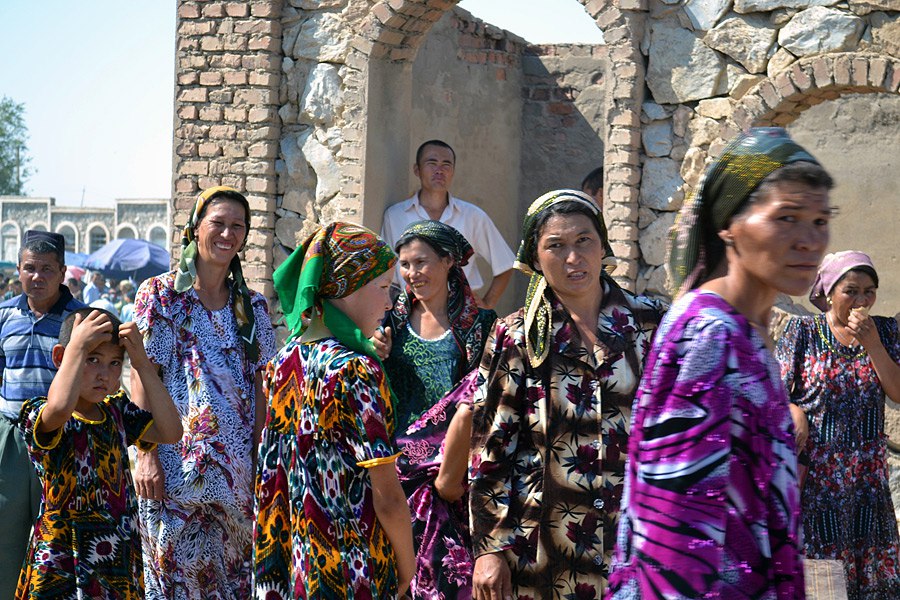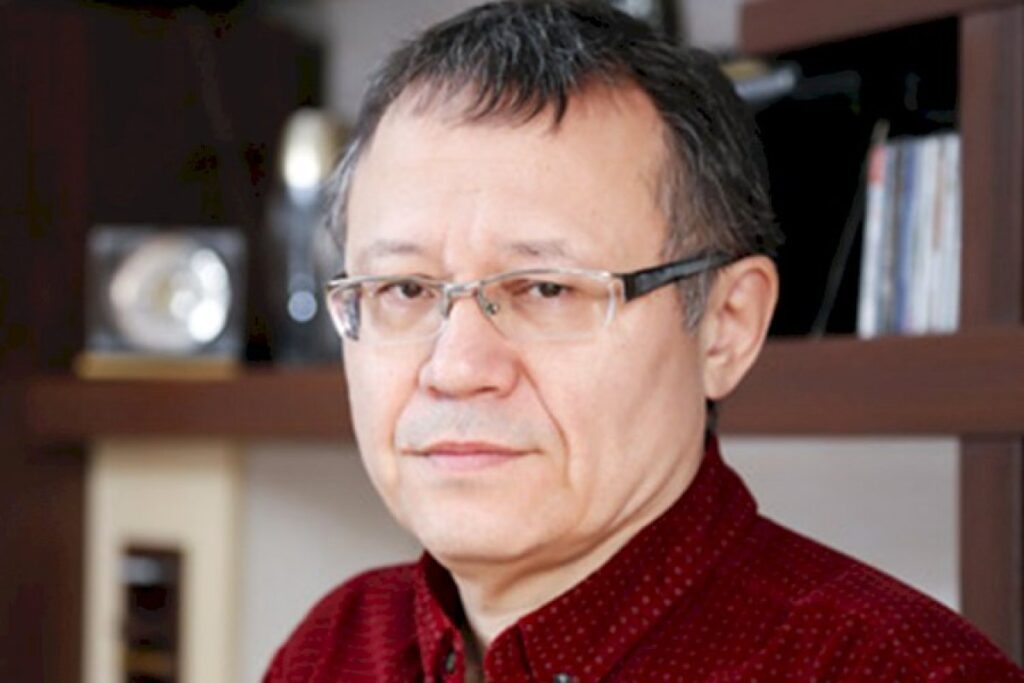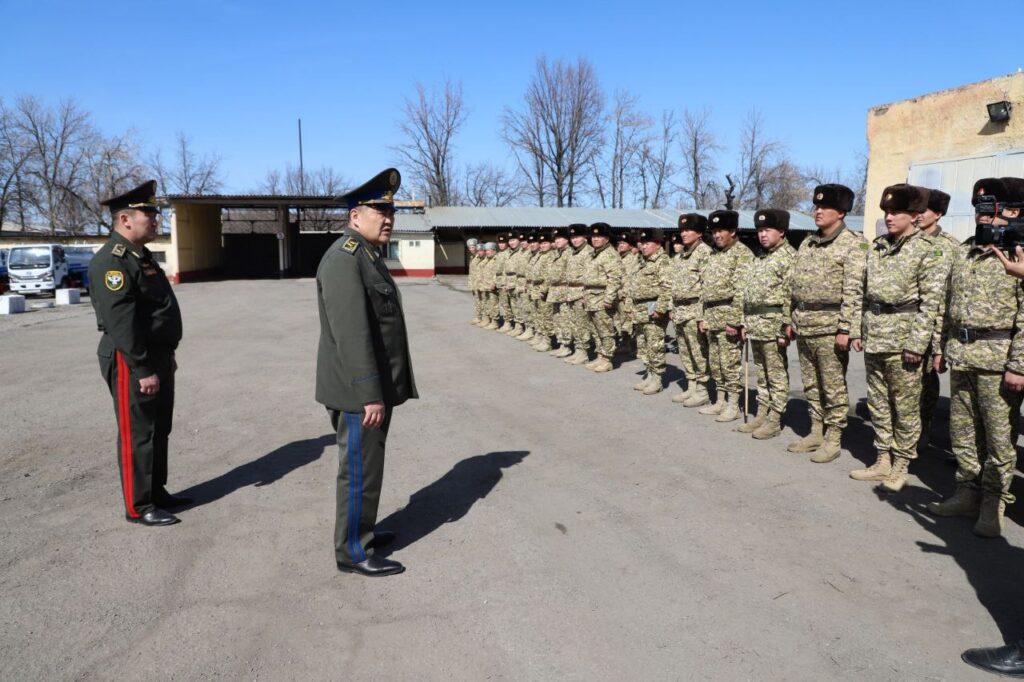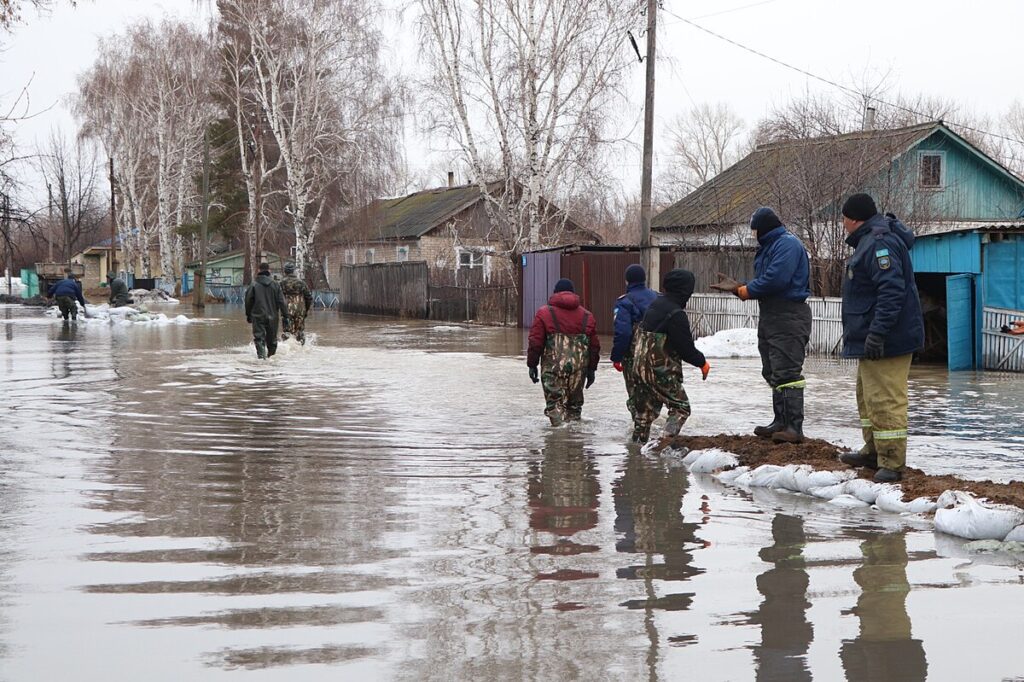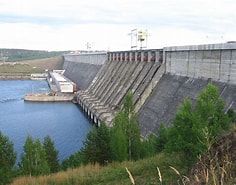The Art of Words: Writer Andrei Orlov Discusses the Development of Kazakhstan’s Literary Industry
Andrei Orlov is an acclaimed writer who has actively influenced the development of Kazakhstan’s literature through the creation of a community of writers and the organization of cultural events. In this interview, he offers his perspective of how the art of the written word shapes a nation’s cultural heritage and...
Azerbaijan and Armenia to Hold Talks in Kazakhstan
Officials in Baku have agreed to a meeting of the foreign ministers of Azerbaijan and Armenia in Kazakhstan. Azeri president Ilham Aliyev stated as much at a meeting with participants of the international forum "COP29 and a Green Vision for Azerbaijan" held at ADA University, Turan.az reports. Aliyev said that...
Kazakhstan Likely To Insist on Revisions to Kashagan Oil Contracts
Kazakhstan is demanding compensation for lost profits from the North Caspian Operating Company (NCOC), the consortium that manages the Kashagan oil field, and arbitration claims have risen to $150 billion. Sources close to Kashagan told The Times of Central Asia that this should send the message to western energy companies...
Kazakhstan Repurposing Floodwater
In a strategic response to the unprecedented spring flooding this year, Kazakhstan is channeling its efforts towards harnessing the disastrous floods to its advantage. The Ministry of Water Resources and Irrigation in Kazakhstan has embarked on a program to utilize the massive floodwaters for future irrigation and environmental sustainability. In...
Britain’s Cameron to Central Asia: Work with Us
Britain’s foreign secretary is in Central Asia this week, seeking deeper ties with a part of the world seen as increasingly vital to international security, energy flows and efforts to combat climate change. The trip, which David Cameron described as overdue, followed criticism that Britain had neglected what the envoy’s...
Disinformation Targets Kazakhstan’s Ties with China, Russia, and the U.S.
Over an eight-day period in April 2024, a barrage of news stories featuring rumors about Kazakhstan’s foreign policy permeated Chinese media. These dubious reports alleged that the U.S. had hyped an unverified leak from a Russian Duma official claiming Kazakhstan was engaged in covert negotiations to join NATO and suggested...
Kyrgyzstan’s Law on NGOs: What Alarms Human Rights Activists?
In April 2024 Kyrgyz President Sadyr Japarov signed a law on non-governmental organizations (NGOs). Now all NGOs must submit full financial reports and register with the Ministry of Justice. Despite the authorities' statements about the need for a document regulating the financing of such organizations, the law has numerous opponents....
Central Asian Countries Set 2024 Quotas for Amu Darya, Syr Darya River Water Usage
Last week in Kazakhstan, delegates came together for the 87th meeting of the Interstate Commission for Water Coordination (ICWC) of Central Asia, where they discussed the potential and limitations of regional water reservoirs ahead of the 2023-2024 agricultural growing season. According to the ICWC, some of the more pressing questions...
President Rahmon Meets with Pope Francis
58 mins ago
300 Children Killed on Kyrgyzstan’s Roads
1 hour ago
Kazakhstan Welcomes Turkish Investors
4 hours ago
Samarkand to Host Asian Women’s Forum Next Month
4 hours ago
Central Asians Not Bananas About Bananas
23 hours ago
Kazakhstan Repurposing Floodwater
2 days ago
Without Security, There Can Be No Development in Afghanistan
Indian author Arundhati Roy once said, “Either way, change will come. It could be bloody, or it could be beautiful. It depends on us.” Almost three years after Taliban’s resurgence to power in Afghanistan, there are practically no developments to highlight in its relations with the outside world. The situation...
Growth of Non-Custodial Sentences in the Kyrgyz Republic Since 2020
The Kyrgyz Republic has reported a decrease of its prison population, which speaks to the ongoing humanization of its criminal justice system. In 2023, the prison population amounted to just 7,728 persons, a 20% decrease compared to 2020 (9,658 prisoners). Despite a 22% increase in the number of convictions, from...
Uzbekistan Seeks to Expand Trade Horizons with Europe
- Opinion by Robert Cutler Uzbekistan's economic landscape has been evolving, with announcements of major reforms and international cooperation aimed at economic modernization and increasing its profile in global markets. Its partnership with the European Union (EU) has focused on critical raw materials. At the same time, Tashkent plans...
The Taliban and its Neighbors: An Outsider’s Perspective
This is part two of a piece of which part one was published here. The topic of a regional approach to solving Afghanistan's problems is increasingly being discussed in various expert and diplomatic circles. The International Crisis Group (ICG), a reputable think tank whose opinion is extremely interesting as part...
Uzbekistan: From Silk Roads to New Horizons
Cradled by the embrace of the Syr Darya and Amu Darya Rivers, Uzbekistan boasts a rich tapestry woven from the threads of history. Being home to trade hubs like Samarkand and Bukhara, this land has been at the center of cultural exchange for over a millennia. From the Turkic-Mongol tribes...
The New Silk Road
In light of the current geopolitical situation in the world, many countries are puzzled by the search for new alternative transport routes. One of these is the Trans-Caspian International Transport Route (TITR), which runs through China, Kazakhstan, the Caspian Sea, Azerbaijan, Georgia, and further to Turkey and European countries. New...
Taliban and its Neighbors: A Regional Format for Overcoming Challenges in Afghanistan and Beyond
The process of making Afghanistan an independent economic entity that can work constructively within globally accepted economic standards and formats will require addressing pressing security issues as well as strengthening regional partnerships and cooperation. In the long term, this will not only benefit the people of Afghanistan but also its...
How India is Becoming a Robust Soft Power in Central Asia
The middle-income trap, a pressing issue that has led to the stagnation of many successful developing economies, demands immediate attention. This trap, which occurs when a middle-income country can no longer compete internationally in standardized, labor-intensive goods due to relatively high wages, is a result of various factors, including countries...
The Priority of Maintaining a United and Stable Afghanistan
The issue of inter-ethnic relations in Afghanistan affects not only the country itself but also its surrounding region. Recent history has placed a heightened importance on the “nation” question in Afghanistan in terms of the country’s political and social stability. Since regaining power in 2021, the de facto Taliban authorities...
The Middle Corridor: How Kazakhstan is Carving its Niche in Europe-Asia Transport
In the aftermath of the pandemic and amid rising geopolitical tensions and sanctions – leading to the breakdown of traditional shipping and logistics chains – the need to develop new, alternative routes for trade has gained particular importance. One such route is the Middle Corridor, or Trans-Caspian International Transport Route,...
One Step Forward, Two Steps Back: the EU’s Indecisive Strategy Towards Eurasia
Times of Central Asia Editorial Marking the next chapter in the geopolitical re-balancing competition between Russia and the West, the European Parliament (EP) on 13 March passed a resolution on deepening ties between the EU and Armenia. The document puts forth the possibility of granting Armenia candidate status for EU...
Central Asia Can Help Bring Afghanistan into the International Fold
Afghanistan's situation remains deeply troubling, reflecting a complex history of conflict and political instability that has severely impacted its social and economic fabric. The Soviet Union's invasion 45 years ago, followed by the Taliban's rise to power in 1996 and the U.S. involvement after the September 2001 terrorist attacks linked...
Kyrgyz Farmers Urged to Supply Agricultural Products to China
The Kyrgyz Ministry of Agriculture, Forestry and Water Resources has urged more domestic businesses to establish and expand trade in agricultural produce with the People's Republic of China (PRC). Kyrgyz farmers and processors currently export wheat flour, cherries, melons, grapes and soybeans to China and to increase food exports, the...
Kazakhstan and the Taliban Discuss Transport Links
Members of Kazakhstan's government and representatives of the Taliban have discussed expanding transportation links between Astana and Kabul, according to the Kazakh government's press service. The Kazakh side has said it's ready to participate in projects to develop the Trans-Afghan corridor: the construction of the railroad routes Termez - Mazar-e-Sharif...
Russian Comments Put Kazakhstan’s Oil Transit to Germany Under Threat
Russia has warned Kazakhstan about the possible suspension of Kazakh crude oil transshipment to Germany through the Druzhba oil pipeline system. The stated reason is the debt of Polish pipeline operator PERN, according to a report by Reuters. Reuters, citing people familiar with the matter, claims that Russia's Transneft has...
Uzbekistan’s First Quarter 2024 Gold Exports Rise to $2.66 Billion
Uzbekistan exported gold worth $2.66 billion in the first quarter (January-March) of 2024. In 1Q 2024, Uzbekistan's total foreign trade turnover amounted to $15.8 billion, which is almost $1 billion (6.2%) more than in the same period in 2023. Exports increased by 10% to $6.38 billion, and imports increased to...
Central Asians Not Bananas About Bananas
According to the agricultural trade publication East Fruit, Central Asians have little taste for bananas. Kazakhstan has the highest consumption rate but with an average of 4.5 kg of fresh bananas eaten per person, per year, comes nowhere near Uganda where each year, individuals enjoy a whopping 270 kg of...
Starlink Close to Providing Internet Access in Remote Parts of Kyrgyzstan
Representatives of Kyrgyzstan's ministry of digital development have met again with the American company Starlink, with a view to bringing satellite internet access to the country. However, there are still regulatory hurdles in Kyrgyzstan that hinder the development of Starlink technology. Elon Musk's aerospace company SpaceX first entered the Kyrgyz...
Kazakhstan Likely To Insist on Revisions to Kashagan Oil Contracts
Kazakhstan is demanding compensation for lost profits from the North Caspian Operating Company (NCOC), the consortium that manages the Kashagan oil field, and arbitration claims have risen to $150 billion. Sources close to Kashagan told The Times of Central Asia that this should send the message to western energy companies...
AI Takes Hold in Kazakhstan’s Finance Industry
The National Bank of Kazakhstan has conducted a survey on the prospects for developing artificial intelligence (AI) in the country. The results of this survey showed that 31% of respondents who work in the finance industry are already using AI in their work. Analysts from the National Bank concluded that...
300 Children Killed on Kyrgyzstan’s Roads
The Director of the Situation Centre of the Kyrgyz Republic, Joldoshbek Mambetaliyev, has issued a harrowing report that since 2021, more than 2,000 people including 316 children, have been killed on roads in Kyrgyzstan. Research by the centre cites the prime causes as poor road surfaces, insufficient lighting, lack of...
Starlink Close to Providing Internet Access in Remote Parts of Kyrgyzstan
Representatives of Kyrgyzstan's ministry of digital development have met again with the American company Starlink, with a view to bringing satellite internet access to the country. However, there are still regulatory hurdles in Kyrgyzstan that hinder the development of Starlink technology. Elon Musk's aerospace company SpaceX first entered the Kyrgyz...
Kyrgyz Servicemen Will Be Allowed to Buy Their Military Housing
A new law in Kyrgyzstan allows military personnel who have served in the Kyrgyz army for more than 20 years to purchase their government-issued housing for temporary use. Additionally, families of servicemen killed in the line of duty -- and former members of the military themselves -- can submit claims...
Kazakhstan Plans To Stop Bloggers From Promoting Gambling
Kazakhstan is preparing big changes for the gambling business in the form of a new bill that's under consideration in the country's lower house of parliament, the Majilis. Should the bill become law, bloggers will be banned from advertising betting platforms and online casinos. These changes are aimed at stricter...
Mudslides in Kyrgyzstan Flood Over 200 Homes
Kyrgyzstan's emergencies ministry has formed an operational headquarters to deal with recent flooding in the south of the country. Rescuers report that hundreds of local residents have been evacuated to safety. Flooding due to heavy rains began last week in Kyrgyzstan's southern Osh region, prompting the region to declare a...
Kyrgyzstan’s Law on NGOs: What Alarms Human Rights Activists?
In April 2024 Kyrgyz President Sadyr Japarov signed a law on non-governmental organizations (NGOs). Now all NGOs must submit full financial reports and register with the Ministry of Justice. Despite the authorities' statements about the need for a document regulating the financing of such organizations, the law has numerous opponents....
Uzbekistan to Open Centres for Workers Seeking Employment Abroad
The Uzbek government is to open 27 educational institutions across the country for the purpose of training potential migrants in professions in demand by foreign employers. Students will also have access to lessons in various languages including English, German, Japanese, Korean and Arabic. Courses will be offered on a paid-contract...
Money of Kazakhstan’s National Fund to Be Invested in New Format
The National Bank of Kazakhstan has revealed its strategy for investing the National Fund's money in alternative instruments, emphasizing the gradual increase in money committed to that tranche of investments to $2.5 billion by 2025. This portfolio, launched in 2023, represents 3% of the total allocation of the savings portfolio...
Kyrgyz Farmers Urged to Supply Agricultural Products to China
The Kyrgyz Ministry of Agriculture, Forestry and Water Resources has urged more domestic businesses to establish and expand trade in agricultural produce with the People's Republic of China (PRC). Kyrgyz farmers and processors currently export wheat flour, cherries, melons, grapes and soybeans to China and to increase food exports, the...
Kazakhstan and the Taliban Discuss Transport Links
Members of Kazakhstan's government and representatives of the Taliban have discussed expanding transportation links between Astana and Kabul, according to the Kazakh government's press service. The Kazakh side has said it's ready to participate in projects to develop the Trans-Afghan corridor: the construction of the railroad routes Termez - Mazar-e-Sharif...
Russian Comments Put Kazakhstan’s Oil Transit to Germany Under Threat
Russia has warned Kazakhstan about the possible suspension of Kazakh crude oil transshipment to Germany through the Druzhba oil pipeline system. The stated reason is the debt of Polish pipeline operator PERN, according to a report by Reuters. Reuters, citing people familiar with the matter, claims that Russia's Transneft has...
Samarkand to Host Asian Women’s Forum Next Month
The Asian Women's Forum will be held in Samarkand this May, where participants will discuss the situation surrounding women's rights in the countries of Central and Southeast Asia. The forum will discuss issues related to expanding women's rights, and reducing poverty in the region by involving women in entrepreneurship. Sessions...
Kazakhstan Likely To Insist on Revisions to Kashagan Oil Contracts
Kazakhstan is demanding compensation for lost profits from the North Caspian Operating Company (NCOC), the consortium that manages the Kashagan oil field, and arbitration claims have risen to $150 billion. Sources close to Kashagan told The Times of Central Asia that this should send the message to western energy companies...
Rosatom Set to Build Small Nuclear Power Plants in Uzbekistan
Russian state nuclear power corporation Rosatom is ready to offer lower-capacity nuclear power plant (NPP) projects to Uzbekistan. That's according to comments made by Denis Manturov, Russia's Minister of Trade and Industry, at the fourth annual international industrial exhibition, Innoprom, Central Asia. “Currently, the Rosatom state corporation and the Uzatom...
Britain’s Cameron to Central Asia: Work with Us
Britain’s foreign secretary is in Central Asia this week, seeking deeper ties with a part of the world seen as increasingly vital to international security, energy flows and efforts to combat climate change. The trip, which David Cameron described as overdue, followed criticism that Britain had neglected what the envoy’s...
Turkmen Dissidents Mark Anniversary of Deadly Storm With Government Protest
On April 27 activists from the Warsaw Post-Soviet Dissident Alliance will hold a protest in Warsaw, Poland, against the Turkmen government. The event is being organized in memory of the dozens of victims of the 2020 windstorm in the city of Turkmenabat. The protest will mark the fourth anniversary of...
The Art of Words: Writer Andrei Orlov Discusses the Development of Kazakhstan’s Literary Industry
Andrei Orlov is an acclaimed writer who has actively influenced the development of Kazakhstan’s literature through the creation of a community of writers and the organization of cultural events. In this interview, he offers his perspective of how the art of the written word shapes a nation’s cultural heritage and...
Kyrgyz Football Gets Boost as Construction Starts on New Stadium
Kyrgyzstan is building a 45,000-seat stadium designed to host Asian Football Confederation finals as well as FIFA group matches. This week, President Sadyr Japarov announced that construction on the new stadium near Bishkek had begun and would take two years. Local and Turkish architects and engineers are involved, and there...
Tennis World No. 4 Rybakina Wins Third Tournament of Year in Stuttgart
Kazakhstan’s Elena Rybakina is leading in 2024 tennis titles - three so far - after a comfortable victory over Marta Kostyuk in the Stuttgart final on Sunday. Rybakina, who has also won titles in Brisbane and Abu Dhabi this year, has now won a tour-leading 26 matches this season. That’s...
Kazakhstan: Floods Still a Threat, but Some Residents Returning Home as Waters Ebb
For weeks, it’s been a frantic grind of evacuations, pumping water and shoring up dams as Kazakhstan battles widespread floods. While the threat remains, water levels are declining in some areas and the country is working to help disaster victims in the long term. Some 22,700 people who fled their...
TikTok Users Struggle to Access App after Kyrgyzstan Announces Restrictions
Kyrgyzstan is restricting access to TikTok. The Ministry of Digital Development sent a letter to internet providers, asking them to block the TikTok social media platform, local media has reported. The ministry cited the network´s failure to comply with a law designed to “prevent harm to the health of children,...
Kazakh News Publisher Says New Media Law Does Little for National Press
Kazakhstan's new law "On Mass Media," recently passed by its lower house of parliament (the Majilis), has agitated the country's reporters. In an interview with The Times of Central Asia, Dzhanibek Suleyev, the publisher of several news sites, remonstrates that the law should have been more supportive of the national press. An...
Development of Kazakhstan’s Cinematography: An Inside Look – An Interview with Kazakh Actor, Abay Kazbayev, on Kazakhstan’s Film Industry and its Prospects for Development
Kazakhstan's film industry is attracting more and more attention globally, and many talented actors are contributing to its development. One such theater and film actor is Abay Kazbayev, who agreed to share his experience and vision of the industry. How did you start in the industry? I have...
Central Asia’s Scorecard on Women’s Rights and Welfare
Women's rights differ significantly around the world, with progress varying greatly from one country to another. Some states have advanced gender equality significantly through strong legal systems and policies while others are hindered by cultural norms and a lack of political commitment. In Central Asia, each of the young nations...
Kuandyk Bishimbayev Pleads Guilty to Negligent Homicide
The judicial inquiry into the case of Kuandyk Bishimbayev concluded on April 24 in Astana. Aitbek Amangeldy, the brother of Saltanat Nukenova, announced that further court dates are scheduled for April 29, 30, and May 2-4. Bishimbayev, who formerly served as Kazakhstan's National Economy Minister, faces allegations of murdering...
Growth of Non-Custodial Sentences in the Kyrgyz Republic Since 2020
The Kyrgyz Republic has reported a decrease of its prison population, which speaks to the ongoing humanization of its criminal justice system. In 2023, the prison population amounted to just 7,728 persons, a 20% decrease compared to 2020 (9,658 prisoners). Despite a 22% increase in the number of convictions, from...
Kyrgyzstan’s Law on NGOs: What Alarms Human Rights Activists?
In April 2024 Kyrgyz President Sadyr Japarov signed a law on non-governmental organizations (NGOs). Now all NGOs must submit full financial reports and register with the Ministry of Justice. Despite the authorities' statements about the need for a document regulating the financing of such organizations, the law has numerous opponents....
Kyrgyzstan’s Special Services Take On The Drug Mafia
The head of Kyrgyzstan's National Security Service, Kamchybek Tashiyev, has commented that unless it is curbed, the country's already highly complex drug situation is likely to be beyond control within ten years. Speaking at a meeting with heads of Kyrgyzstan's police departments, Tashiyev said that the number of both drug...
Traffickers of Human Organs Detained in Kyrgyzstan
The State Committee for National Security (SCNS) of Kyrgyzstan has detained members of an international criminal group at Manas Airport. The criminals had organized a black-market channel for the illegal sale of human organs abroad. All detainees are citizens of the Kyrgyzstan. According to the investigation, the criminal group looked...
Islamic State – Khorasan Province: An Element of Geopolitical Rivalry?
In the aftermath of the terrorist attack in Moscow, the media has once again been saturated with discussions about the terrorist group Islamic State – Khorasan Province (ISKP), also known as ISIS-Khorasan and “Wilayat Khorasan.” At this point, most of the coverage has focused on the Afghan wing of Islamic...
Kazakhstan President Signs Landmark Legislation on Domestic Violence
On April 15, President Kassym-Jomart Tokayev signed into law amendments and additions passed by Kazakhstan’s parliament on April 11 on legislative acts and the code on administrative offenses on ensuring the rights of women and the safety of children. The initiative represents a first in the CIS in terms of...
The Bishimbayev Trial: The Women of Kazakhstan Speak
The trial of the trial of former Minister of the Economy, Kuandyk Bishimbayev, has ignited discussions across Kazakhstan, particularly among women. Online actions and rallies across Europe have been organized in memory of the victim, Saltanat Nukenova, and the Senate has passed a law strengthening protections for women and children...
Kazakhstan Repurposing Floodwater
In a strategic response to the unprecedented spring flooding this year, Kazakhstan is channeling its efforts towards harnessing the disastrous floods to its advantage. The Ministry of Water Resources and Irrigation in Kazakhstan has embarked on a program to utilize the massive floodwaters for future irrigation and environmental sustainability. In...
Mudslides in Kyrgyzstan Flood Over 200 Homes
Kyrgyzstan's emergencies ministry has formed an operational headquarters to deal with recent flooding in the south of the country. Rescuers report that hundreds of local residents have been evacuated to safety. Flooding due to heavy rains began last week in Kyrgyzstan's southern Osh region, prompting the region to declare a...
U.S. Government Discusses Data From Air Quality Monitor at Tashkent Embassy
On April 22, a press conference was held at the U.S. Embassy in Uzbekistan with American air quality specialist and researcher Jay Turner speaking to media representatives about the air quality monitoring device installed at the embassy in Tashkent in 2018. According to Turner, the device monitors the concentration of...
Central Asian Countries Set 2024 Quotas for Amu Darya, Syr Darya River Water Usage
Last week in Kazakhstan, delegates came together for the 87th meeting of the Interstate Commission for Water Coordination (ICWC) of Central Asia, where they discussed the potential and limitations of regional water reservoirs ahead of the 2023-2024 agricultural growing season. According to the ICWC, some of the more pressing questions...
Kazakhstan: Floods Still a Threat, but Some Residents Returning Home as Waters Ebb
For weeks, it’s been a frantic grind of evacuations, pumping water and shoring up dams as Kazakhstan battles widespread floods. While the threat remains, water levels are declining in some areas and the country is working to help disaster victims in the long term. Some 22,700 people who fled their...
No Lessons Being Learned From Kazakh Floods, Says Political Analyst
Kazakhstan has been prone to flooding before, but the 2024 Kazakh floods have added a catastrophic page to the chronicles. Political analyst Marat Shibutov tells The Times of Central Asia that only extremely tough measures can motivate ministers and akims (local government executive) to actually work on flood prevention. ...
Kyrgyzstan, Kazakhstan and Uzbekistan Consider Joint-Stock Company to Build Kambarata HPP-1
Kazakhstan’s Ministry of Energy has announced that the draft Agreement between the governments of Kyrgyzstan, Kazakhstan, and Uzbekistan on the joint implementation of the construction and operation of Kambarata hydroelectric power plant (HPP)-1 has been posted on Kazakhstan’s official Internet portal Open Legal Acts. Available for public discussion, the agreement...
“Eco-Enthusiasts” – Tashkent Hosts Environmental Competition for Students
On April 13, an environmental awareness competition, "Eco-Enthusiasts" was held in Tashkent's Zahiriddin Muhammad Babur Central Ecopark. The event was organized in accordance with the decree of the President, "On measures for effective work of the Ministry of Ecology, Environmental Protection and Climate Change," and was timed to coincide with...






